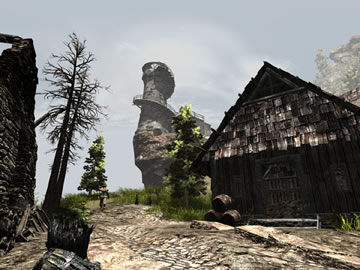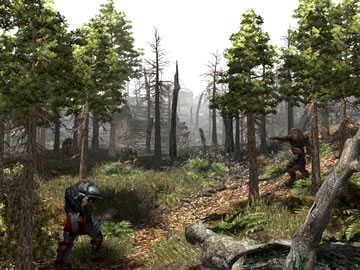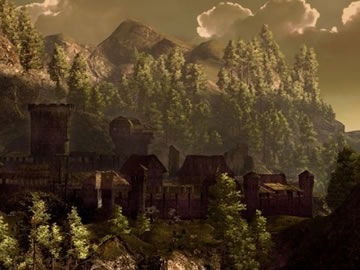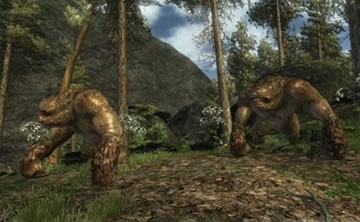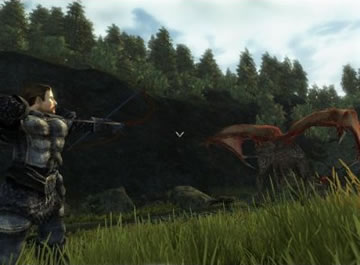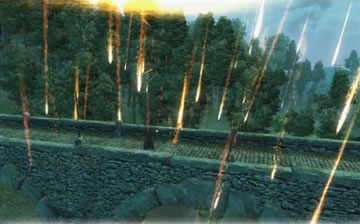Gothic III PC Review
First things first, DO NOT take any notice of the score given to this game. It’s one of the most pointless numbers that’s ever had the chance to exist, and it can’t be stressed enough how insignificant it is in this case. Seriously, just read the text rather than be an idiot and base your opinion of the game on a number selected almost at random. You’ll see what I mean.
Right then, now that that’s sorted, let’s get down to business. Gothic III, the third (obviously) game in a highly acclaimed series to date, is finally upon us, as the Unnamed Hero returns from the island of Khorinis to the mainland, where he finds that the orcs have invaded and enslaved most of the population. Working under their God-like reputation in Germany, granted upon them by their multitude of devoted fans there, Piranha Bytes have been busy crafting this next instalment with the weight of massive (so tempted to put damage here) expectation on their shoulders. You’d think the recent release of Oblivion, with all the success it brought, would perhaps tempt them to subtly mimic a few of the ideas in the hope of riding on the popularity spike left in its wake, but this couldn’t be further from the truth. It’s obvious that this game was developed with pure intentions, unblemished from outside intrusions, simply because of its unique charm and character, and the way in which, when working properly, everything fits together so well, giving the feeling that it shouldn’t be any other way.
Now, I say ‘when working properly’ with good reason, for this game is one of the buggiest and most problematic I’ve ever experienced. It’s chock full of the things, and most annoyingly of all, they crop up at the most inconvenient times. How so many faults slipped through the playtesters’ apparently very holey net is anyone’s guess, but it points towards the game being rushed out to meet the deadline before it was really ready to be played. The fact that a patch was released for the game before it was actually supposed to come out seems to emphasise this point, though unfortunately it didn’t really make things any better. Some sympathy must be given to the development team, as it consisted of less than 20 people for most of the development cycle, and what they’ve managed to achieve with such a small team is quite amazing; there’s a huge world to explore, four times larger than that of Gothic II, which is filled with detail everywhere you look. However, it’s very apparent that either more time or more people are needed, as unfortunately all these glitches are enough to put a lot of people off the game who might have absolutely loved it otherwise. On the bright side, at least the bugs are varied enough to stop them becoming boring. For instance, sometimes loading a game can cause the Unnamed Hero to become invisible, save for his weapons, leaving just a floating sword moving around and getting attacked. Another time, a wild boar (nasty, nasty things) attacked an orc warrior, causing him to back up against a cliff and then subsequently fall through the rock face. Of course, the boar followed straight after, and then they both died. Amusing stuff, see? At other times, the game randomly speeds up insanely, with each day and night lasting for about 3 seconds, causing you to run around madly and then get thrown across a room by a particularly angry lizard. Most annoying.
It’s not all bad though, not by any means. The large and beautiful world is, well, large and beautiful. True, the detail of the landscape in the far distance could be better, but on the whole the view is gorgeous. A word of warning though; Gothic III is rather intensive on the CPU usage, with frequent moments of slowdown as more things are loaded to the cache. Some people have reported problems with running the game smoothly, so it’s recommended that you have a high end pc if you want to play this game whilst keeping any trace of sanity. Now, if the game’s going to be compared to any other, it should probably be Oblivion for ease of remembrance alone, and the results are mixed. The world itself in Gothic III is a lot more ‘alive’ and believable than Oblivion’s, with NPCs actually acting a lot more realistically. They don’t just stand around looking mad, deciding to eat an apple at odd times, but instead they show a lot more variation in their actions. For instance, shopkeepers actually open their shop in the morning, sweep the area to make it clean, and perhaps go for a drink in the evening. Blacksmiths don’t just stand behind a counter, but instead actually hammer out their crafts on an anvil, smelt metals in a forge, then maybe have a meal at midday. They’re only small things, but they make a big difference to the playing experience.
Complementing the visuals is the superb musical score, with its emotional string passages for the calmness of a village, to the harshness of deep foreboding brass (with more than a little Lord of the Rings influence) for combat. This is some of the best music I’ve heard in a game, and really succeeds in heightening the atmosphere. The quality is crisp and clear, and there’s not a bad track to be heard. If you just like listening to music in games (not that many people do) then buy this game (or perhaps just the soundtrack if you’re feeling more sensible).
Unfortunately, such praise can’t be given to the combat system. It’s not terrible, but it could do with a patch to sort it out. Different attacks are pulled off using the left and right mouse buttons, with the right button also controlling your defensive manoeuvres. Sounds alright so far, but then the problem doesn’t lie in the controls themselves, but the sluggish way in which combat in general is carried out. Parrying seems to randomly switch between being a useful block and doing nothing at all, leaving you wondering if there’s any point in doing it at all. Then there’s some evil, evil foes that have irrationally fast attacks, much faster than our dear hero’s, meaning that once they start attacking they can pull off another five or so attacks before you have a chance to counter, often killing you in the process. On top of this, there’s a wildly irregular difficulty curve that seems to go up and down all over the place. For example, when one of the early quests sends you to kill some wild boars, little do you know the terror that awaits you. The fact that you’ve managed to dispatch a group of orc hunters a little while ago with little resistance just adds to your false sense of security, until you meet the gang of four-legged buggers. Running in, sword raised, you strike the first one on the head, then realise to your horror that you’ve hardly done any damage. What’s more, the boar then rears its head and bashes into you about five times in one second, sending you flying across the ground in a crumpled mess. Yes, that’s right folks, the most fearsome and annoying enemies in the game are… wild boars. Who needs Cliff racers!
Anyway, enough about combat. Quests and menu systems are equally important, and luckily this is where the game truly excels. Everyone in the game belongs to a specific faction, whether it’s the invading orcs, the rebels resisting their invasion, or the Hashishin, similar in nature to Dune’s Fremen. Doing a quest for a specific faction increases your reputation with them, and might decrease your popularity among the others. What’s more, the game offers true freedom, rather than disguised linearity, and this results in three different endings depending on your actions throughout the game. The quest log keeps track of quests in the form of conversations rather than journal entries, and is easy to navigate. The same goes for the inventory, which is clearly categorised for ease of use, something of a blessing when you consider the hundreds of things you need to keep track of at once. Levelling up is achieved by, rather obviously, completing quests and killing things, granting you 10 more training points per level which can be spent on improving your skills and stats by speaking to the relevant trainers. With all the different options available, you can choose to become a stealthy guy, a spell-stocked mage, a mighty warrior, or whatever other stereotypical fantasy bloke you feel like, though to be honest you’ll most probably find yourself becoming an all-rounder rather than anything specific. Sometimes you’ll be helped out by other people who join you for a while, helping out in fights so you can have it a little easier for a while. At least, that’s what you’d hope. Instead, they slow you down as you wait for them to catch up, and half the time they don’t bother fighting anyway. Let them tag along at your own risk, you have been warned!
So… this is a really hard one to judge. It’s a real marmite bottle of a game, and therefore any score given is completely irrelevant to half the people reading this. All the bugs present, and there are a lot of them, will spoil the game completely for a lot of people, making them think it’s one of the worst games they’ve ever played. However, there’re other people who will willingly play through the glitches, and when they do they will experience moments of pure wonder when the game actually shows the brilliance it’s truly capable of producing. The freedom in itself is fantastic, and the charm and little touches present, like roasting meat at a campfire to increase its health-giving loveliness, all add up to create something pretty special. This game could have been so much more, and perhaps still will be if it’s patched enough to fix the most infuriating problems, but in its current state it’s gonna be loved and hated in equal measures. A bit like marzipan really.
Reviewer’s system: AMD Athlon 64 Dual Core 4200+ (each core is 2.21 GHz) with 1GB RAM, an ATI Radeon X800XL (256-bit) Graphics Card and a 300GB Hard Drive.
Some will love it, others will hate it. This score is meaningless.
